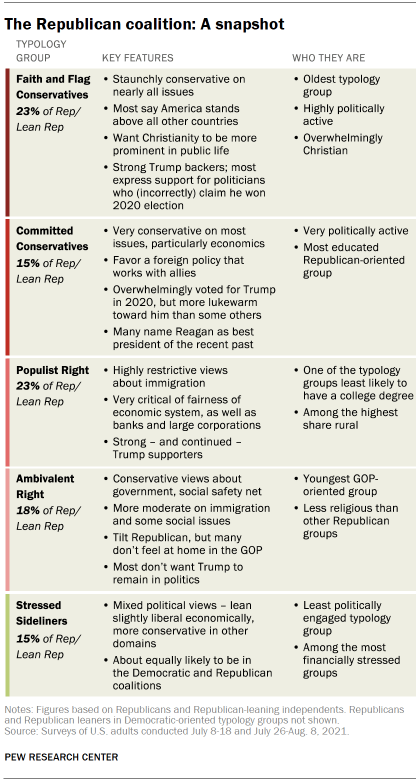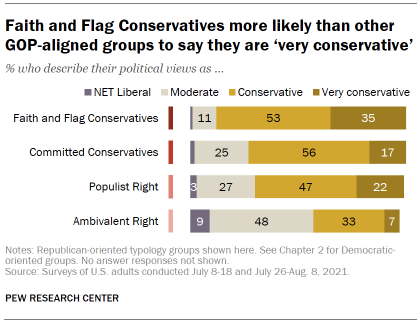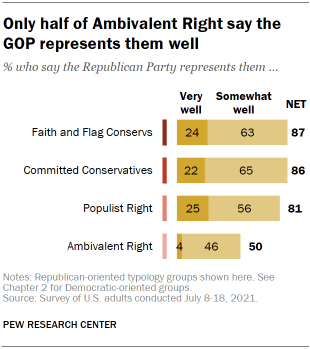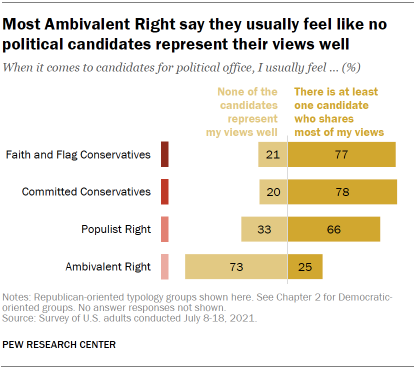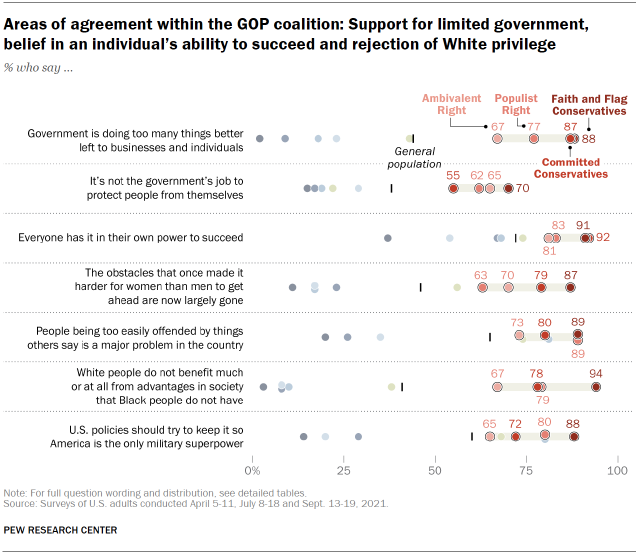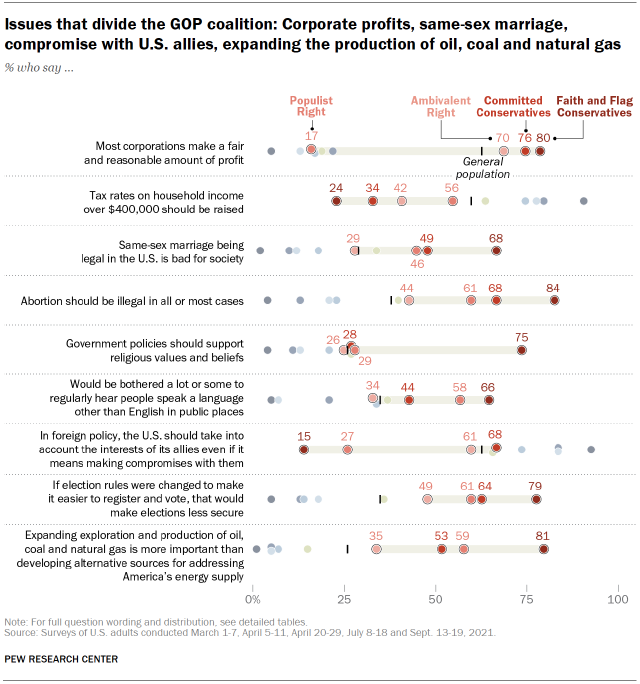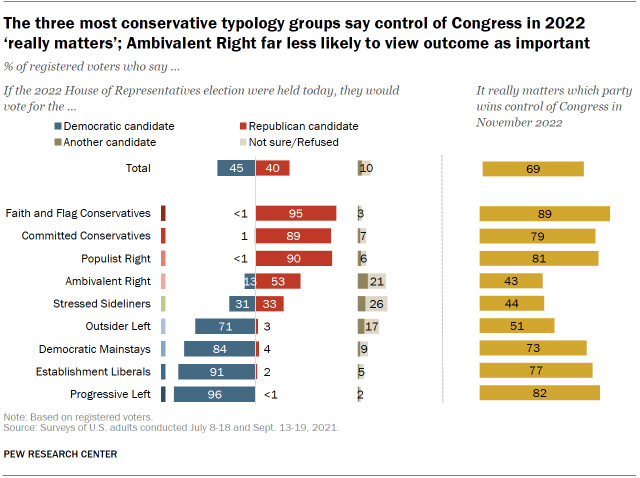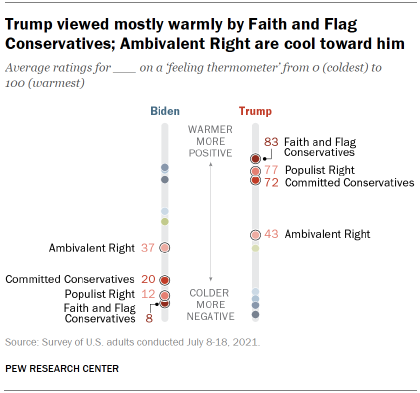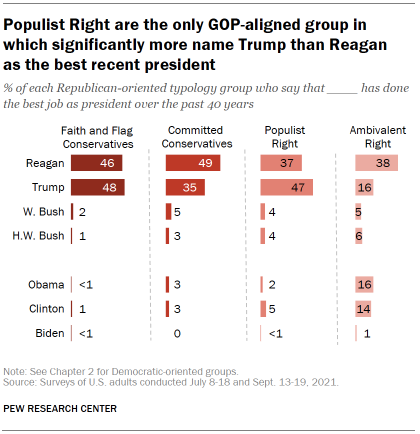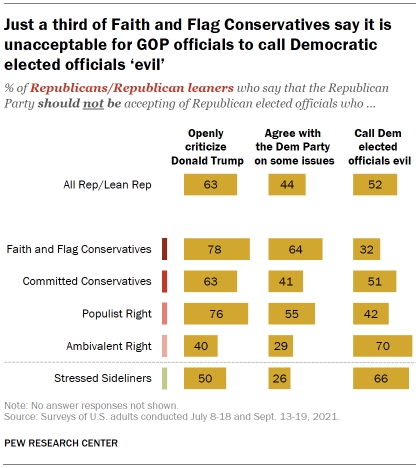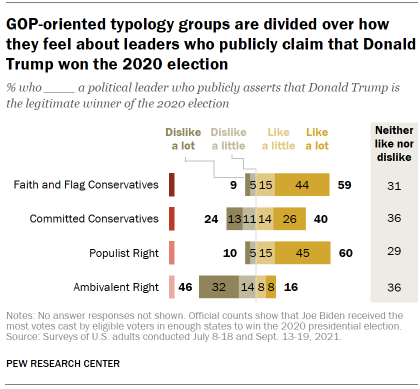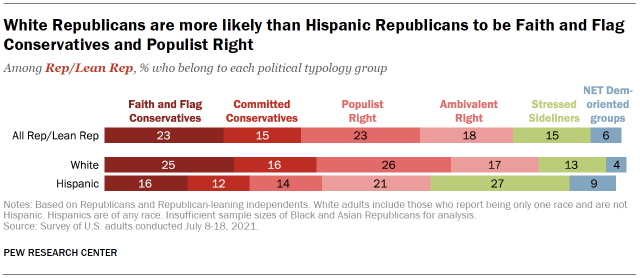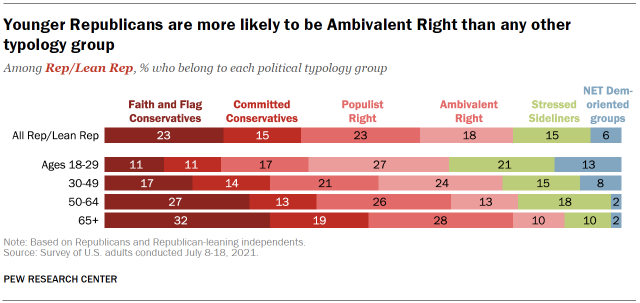The Republican-aligned groups in the political typology are united by shared preferences for a smaller role for the federal government, a strong U.S. military and a rejection of the view that the country needs to do a great deal more to address racial inequities. But when it comes to several other issue areas – particularly views of economic fairness, immigration and foreign policy – there are stark differences between several groups under the GOP umbrella.
Although GOP-oriented groups generally are united in placing importance on securing U.S. borders, groups within the coalition hold starkly different views about the extent to which illegal immigration is a problem in the country, as well as over the nation’s approach to legal immigration.
And there is a cleavage in the coalition around views of the economic system itself: Two typology groups who both hold highly restrictive views about immigration – Faith and Flag Conservatives and Populist Right – differ over corporate power, economic inequality and taxation of large businesses and wealthy individuals.
Ambivalent Right, the youngest GOP-oriented group, diverge from other groups in the coalition in both their weak attachment to the party and their more moderate views on social issues like same-sex marriage, abortion and marijuana legalization. At the same time, Faith and Flag Conservatives, one of the oldest segments of the party coalition, are characterized by a strong Christian affiliation, extremely conservative social views and a view that government policies should bolster religious values and beliefs.
Still, GOP-oriented groups are more united than divided over issues related to race and gender: For example, majorities across the Republican coalition say that the country has made a lot of progress on addressing racial and ethnic inequality over the last 50 years and that, looking forward, little or nothing more needs to be done. Similarly, most reject the contention that White people in America benefit from societal advantages that Black people do not have. In the same vein, majorities across GOP-oriented groups say that “people too easily taking offense to things others say” is a major problem for the country, while far fewer think that “people saying things that are very offensive to others” is a major problem.
The most deeply conservative group in the political typology – Faith and Flag Conservatives– make up 23% of Republicans and independents who lean toward the Republican Party, making them one of the two largest groups in the GOP coalition. Conservative across the board, they are one of the most politically engaged typology groups. Fully 88% of Faith and Flag Conservatives say their political views are conservative, including 35% who describe themselves as “very conservative.” They are overwhelmingly White and Christian and stand out for their views on the role of religion in public life. They are among Donald Trump’s strongest supporters – both while he was in office and today. Most say Trump definitely or probably is the legitimate winner of the 2020 election, despite official counts showing that Joe Biden was the legitimate winner. And 79% say there has been too much attention paid to the Jan. 6 riot at the U.S. Capitol.
Committed Conservatives are one of the two smallest groups in the political typology; they constitute 15% of Republicans and Republican leaners. They are loyal Republicans with pro-business views and are staunch advocates of limited government; most (73%) identify as conservative. However, they differ from Faith and Flag Conservatives and Populist Right in prioritizing U.S. relationships with allies in foreign policy and in taking a less restrictive approach to immigration. While they hold positive views of Trump and nearly all voted for him in 2020, they are not nearly as enthusiastic about the former president as the two other conservative groups. And when asked to name the best president of the last 40 years, they are much more likely to say Ronald Reagan than any of his successors.
Populist Right – 23% of Republicans and Republican leaners – are one of the two largest groups in the GOP coalition, along with Faith and Flag Conservatives. They also are deeply conservative and reliably vote Republican. Yet they differ from Committed Conservative on two key dimensions: They hold hard-line immigration views and are highly critical of the economic system. They are the sole Republican-oriented group in which majorities say the economic system in the country unfairly favors powerful interests, that businesses in this country make too much profit and that taxes on household income over $400,000 should be raised. Like Faith and Flag Conservatives, Populist Right strongly support Trump, and most (81%) would like him to remain a prominent political figure, including 57% who say he should run for president in 2024.
The other Republican-oriented group in the political typology – Ambivalent Right – also are the only GOP coalition group in which most do not identify as politically conservative. With their combination of political values, they are cross-pressured politically: While they hold nearly down-the-line conservative views about the size of government and the economic system and lean more right than left on issues of race and gender, they are far more moderate on immigration and on social issues like abortion, same-sex marriage and marijuana legalization.
Reflecting this cross pressure, a quarter of Ambivalent Right identify as Democrats or Democratic leaners. Still, Ambivalent Right make up 18% of all Republicans and Republican leaners. They are considerably younger than those in other GOP-oriented groups and less politically engaged. They are much less likely than other groups in the coalition to say the Republican Party represents them well or to feel like they have options to vote for political candidates who represent their views. And, unlike those in other GOP-oriented groups, they have more negative than positive feelings about Trump, with 63% saying they would prefer he not remain a major national political figure.
Stressed Sideliners, despite not having a clear partisan tilt, make up small but significant shares of both the Republican and Democratic coalitions (15% of Republicans and Republican leaners, 13% of Democrats and Democratic leaners). This group is financially stressed and relatively unengaged with politics.
They generally have attitudes that place them near the center of overall public opinion, tilting more conservative than liberal on some social issues and more liberal than conservative on economic issues. And while they vote at significantly lower rates than other typology groups, 43% of them cast ballots in 2020 – with roughly half of them voting for Trump.
An additional 6% of Republicans and Republican leaners belong to a Democratic-oriented typology group. These are individuals who lean Republican but whose values and attitudes are more aligned with a group whose other members tend to be affiliated with the Democratic Party. (Similarly, 8% of Democrats and Democratic leaners belong to Republican-oriented typology groups.)
Areas of general agreement within the Republican coalition
Two-thirds or more of those in all four Republican-oriented groups share a belief that government is doing too many things that would be better left to individuals and the private sector, and there is a widespread belief that individuals are responsible for their own success.
The GOP coalition also generally shares an outlook that historical obstacles faced by women and people who are not White are now largely gone: At least six-in-ten across all GOP-aligned groups say that obstacles that once made it harder for women than men to get ahead are now largely gone, and comparably large majorities say that the country has made a lot of progress over the past 50 years in ensuring equal rights for all Americans regardless of race and ethnicity.
The Republican-oriented typology groups also widely favor policies aimed at making sure that the United States remains the world’s sole military superpower. And while they differ over whether the size of the U.S. military should be increased or kept at its current size, they largely reject reductions in the size of the military. No more than about one-in-ten say the size of the military should be reduced. Note: For full question wording and distribution on each question, see detailed tables.
Political values and issues: Where there are divides in the GOP coalition
There are a number of issues that divide Republican-oriented groups in the political typology, and different sets of issues split the GOP coalition in different ways.
On abortion and same-sex marriage, for example, Faith and Flag Conservatives express highly conservative views, while Ambivalent Right stand out for their more moderate opinions. On both issues, the attitudes of Committed Conservatives and Populist Right fall between these two groups. A similar pattern is evident in support for expanding exploration and production of fossil fuels: Faith and Flag Conservatives are more than 40 percentage points more likely than Ambivalent Right to favor this, with the other groups in between.
When it comes to the influence of religion on government policy, Faith and Flag Conservatives stand alone: They are the only group in which a majority (75%) says government policies should support religious values and beliefs. Fewer than a third in other Republican groups say the same.
As noted, Populist Right are deeply skeptical of corporations. In fact, just 17% say corporations make a fair and reasonable profit; that compares with 70% or more of the other GOP-aligned groups. In views of U.S. relations with its allies, majorities of Committed Conservatives and Ambivalent Right say the U.S. should heed allied interests even if it means compromising with them. Much smaller shares of Faith and Flag Conservatives and Populist Right express this view.
The Republican-oriented groups: Voting and views of the presidents
Almost all Faith and Flag Conservatives (99%), Committed Conservatives (96%) and Populist Right (97%) who voted in the 2020 presidential election cast their ballots for Donald Trump, as did a narrower majority (70%) of Ambivalent Right voters. Though to some degree this reflects that about a quarter of Ambivalent Right lean to the Democratic Party, Trump’s level of support among Ambivalent Right who identify as Republicans or Republican leaners was still somewhat lower than among the other Republican-oriented groups: 86% of Ambivalent Right Republican voters backed Trump, while 10% voted for Biden and 4% voted for someone else.
Faith and Flag Conservatives voted at very high rates in 2020: 85% of those eligible have a record of having voted, as do 78% of Committed Conservatives. Populist Right (67%) turned out at a rate little different from that of citizens overall, while just 55% of Ambivalent Right eligible voters cast ballots in 2020. And while roughly half of Stressed Sideliners (45%) voted, about half of those who did vote (49%) voted for Trump.
Looking ahead to the 2022 midterm elections, Faith and Flag Conservatives are most likely among Republican-oriented groups to say it really matters which party wins control of Congress (and most likely to say this among all typology groups). Nearly nine-in-ten Faith and Flag Conservatives who are registered voters (89%) say this, compared with about eight-in-ten Populist Right (81%) or Committed Conservatives (79%).
Just 43% of Ambivalent Right registered voters say it really matters which party wins control of Congress next year, and about half of this group (53%) say they would vote for a Republican candidate if the election for U.S. House were held today (13% would favor a Democrat, while 12% say they would opt for “another candidate” and 21% say they aren’t sure). Overwhelming shares of registered voters in other GOP-oriented groups say they would vote for a Republican candidate if the election were held today.
Faith and Flag Conservatives feel more positively about former president Trump than those in other Republican-oriented groups. On a “feeling thermometer” where 0 is the coldest rating and 100 is the warmest, Faith and Flag Conservatives give Trump a very warm average rating of 83. Populist Right and Committed Conservatives also rate Trump warmly, with average ratings of 77 and 72, respectively. Ambivalent Right are much less warm toward Trump, giving him an average rating of 43. This rating is somewhat higher (52) among Republicans and GOP leaners in Ambivalent Right.
Ambivalent Right also give Joe Biden a less chilly rating than other Republican-oriented groups, though they still feel coolly toward the president. Ambivalent Right give Biden an average rating of 37, compared with very cold average ratings of 20 from Committed Conservatives, 12 from Populist Right and just 8 from Faith and Flag Conservatives.
Asked who has been the best president of the last 40 years, Faith and Flag Conservatives are about equally likely to choose Trump (48%) and Reagan (46%), while Populist Right are more likely to name Trump (47%) than Reagan (37%). (Far smaller shares name any other president – including both George H.W. and George W. Bush.)
Committed Conservatives and Ambivalent Right both name Reagan more frequently than Trump: 49% of Committed Conservatives choose Reagan as the best president while 35% choose Trump. About four-in-ten Ambivalent Right (38%) say Reagan, while 16% say Trump; similar shares name Barack Obama (16%) and Bill Clinton (14%). (Among only Ambivalent Right who identify with or lean toward the Republican Party, 48% name Reagan as the best president while 22% name Trump.)
Who should be allowed in the Republican Party tent?
A majority of Republicans and Republican leaners (63%) say that the Republican Party should not be accepting of elected officials who are openly critical of Trump, including 78% of Faith and Flag Conservatives, 76% of Populist Right and 63% of Committed Conservatives. Ambivalent Right and Stressed Sideliner Republicans are more open to officials who criticize Trump: A majority of Republicans and Republican leaners who are Ambivalent Right (58%) say the party should be somewhat or very accepting of those who criticize Trump, and 49% of Republicans and Republican leaners who are Stressed Sideliners say this.
Across the board, Republican-oriented groups are more willing to accept elected officials who sometimes agree with the Democratic Party than they are officials who criticize Trump. While most Faith and Flag Conservatives (64%) and Populist Right (55%) say the Republican Party should not be accepting of elected officials who agree with the Democratic Party on some important issues, 59% of Committed Conservatives and even larger majorities of Ambivalent Right (70%) and Stressed Sideliners (73%) who are Republicans or Republican leaners say the party should be accepting of those who agree with the Democrats on some important issues.
Majorities of Republicans who are Ambivalent Right (70%) or Stressed Sideliners (66%) say the GOP should not be accepting of officials who call Democratic elected officials evil, though this drops to about half (51%) of Committed Conservatives and fewer than half of Populist Right (42%) or Faith and Flag Conservatives (32%).
GOP coalition differs over 2020 election outcome
Six-in-ten Populist Right and a nearly identical share of Faith and Flag Conservatives (59%) say they like political leaders who assert that Trump is the legitimate winner of the 2020 election, despite official counts showing that Biden was the legitimate winner. While Committed Conservatives are less likely to express this preference, on balance more say they like a leader who asserts Trump won (40%) than say they dislike a leader who asserts this (24%); about a third of Committed Conservatives (36%) say they neither like nor dislike leaders who assert Trump was the legitimate winner.
By contrast, almost half of Ambivalent Right (46%) say they dislike a political leader who asserts Trump won the 2020 election, while just 16% say they like those who assert this (36% say they neither like nor dislike this). Even those Ambivalent Right who are Republicans or lean Republican are about twice as likely to say they dislike a leader who asserts Trump won as they are to say they like such a leader (41% vs. 20%).
These differences between groups reflect differences in attitudes about the 2020 election itself. Faith and Flag Conservatives and Populist Right are most likely to contend that Trump definitely or probably received the most votes cast by eligible voters in enough states to win the election, with more than eight-in-ten in each group claiming this (86% of Faith and Flag Conservatives, 85% of Populist Right). About six-in-ten Committed Conservatives (62%) also contend Trump definitely or probably won, compared with about a third (35%) of Ambivalent Right who say this. Ambivalent Right are the only Republican-oriented group in which a majority (62%) say that Joe Biden definitely or probably received the most votes cast by eligible voters in enough states to win the election.
Race and ethnicity, age and the GOP coalition
Faith and Flag Conservatives and Populist Right make up larger shares of the Republican coalition than other groups. Each account for nearly a quarter (23% each) of all Republicans and Republican leaners. Faith and Flag Conservatives (25%) and Populist Right (26%) make up about half of White Republicans.
However, Hispanic Republicans are more likely to be Stressed Sideliners than they are to be Faith and Flag Conservatives or Populist Right. About a quarter of Hispanic Republicans (27%) are Stressed Sideliners, while just 16% are Faith and Flag Conservatives and just 14% are Populist Right; 12% are Committed Conservatives, roughly the same as the overall share of Republicans in this group, while 21% are Ambivalent Right.
Older Republicans are much more likely than younger Republicans to be Faith and Flag Conservatives and somewhat more likely to be Populist Right. About a third of Republicans 65 and older (32%) and 27% of those ages 50 to 64 are Faith and Flag Conservatives, compared with 17% of Republicans ages 30 to 49 and just 11% of those under 30. Nearly three-in-ten Republicans 65 and older (28%) are Populist Right, compared with 17% of those under 30.
The youngest Republican adults are more likely to be Ambivalent Right or Stressed Sideliners than older Republicans. Republicans under 30 are nearly three times as likely as those 65 and older to be Ambivalent Right (27% vs. 10%) and about twice as likely to be Stressed Sideliners (21% vs. 10%). And 13% of Republicans under the age of 30 have political values that place them in Democratic-oriented groups, compared with just 2% of those ages 50 and older.
